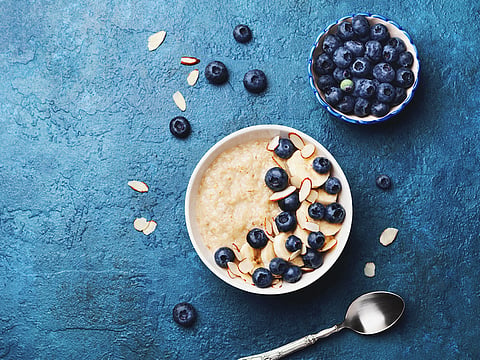Eating: Nothing more than emotions
What you eat doesn’t just impact your waistline, it can change your mood

The human body really is one giant biochemical lab, and studies suggest that it isn’t just how you feel that affects what restaurants you have on speed dial. Researchers believe diet may change the way you feel and react to events around you — not just immediately, but sometimes up to two or three days later.
Our dietary preferences aren’t as hardwired as we think. That’s good news when it comes to everyday issues, because while we don’t have the full picture, studies demonstrate a link between diet and emotions. As part of the emerging discipline of nutritional psychiatry research, a range of compounds occurring in food seem to improve depression, for example, including the Omega-3 fatty acids, zinc and folate, while others are linked to feelings of optimism.
Blueberries and blueberry juice are associated with having a more positive mood.

“It is commonly assumed that food can affect mood. One prevalent notion is that food containing tryptophan increases serotonin levels in the brain and alters neural processing in mood-regulating neurocircuits,” Marijn C.W. Kroes, of the Donders Institute for Brain, Cognition, and Behaviour at Radboud University in Nijmegen, wrote in a 2013 study published in Science Direct. The body uses the amino acid tryptophan to make proteins that regulate our moods and appetite (serotonin), sleep and inflammation (melatonin), and cholesterol (niacin or vitamin B3). It is sold over the counter in some countries, but as with other compounds, is most effective when the body can pull it out of food.
Kroes and her colleagues showed that tryptophan and other long-neutral-amino-acids lift mood in healthy young women — specifically by affecting mood-regulating neurocircuits, they wrote in the paper.
High-protein foods such as chicken, turkey and beef aren’t just satisfying, filling meal choices, they should be on your plate because they trigger the release of dopamine.

But what does that mean for us today? If you’re struggling to understand how that biological soup should affect what you eat, you can rest easy. We asked nutritionists to explain the food-mood connection. Here are the 10 foods they recommend.
Fermented foods
If fermented foods have been trending recently — a movement set to continue into 2019 — there’s good reason. Kimchi, sauerkraut, kefir, kombucha, appams and dosas, doogh, yoghurt and stinky tofu are all rich in probiotics, the beneficial bacteria that live in our intestinal tracts. “There has been a lot of research to study the link between the bacteria in the gut and their association with mood,” Dr Wafaa Ayesh, Director of the Clinical Nutrition Department at Dubai Health Authority, says. “Studies have shown that these probiotics can reduce social anxiety and improve the mood. Fermented foods and probiotics can also help with depression and anxiety.”
Bananas
Whether you eat them with a fork and knife, as Queen Elizabeth II does, or whether you think they’re a finger food, bananas are packed with beneficial nutrients, including tryptophan, the vitamins A, B6 and C, fibre, potassium, phosphorous and iron. They’re also a good source of carbs, Dr Wafaa says. “Mood-boosting carbohydrates help the brain to absorb tryptophan, while vitamin B6 facilitates the conversion of tryptophan into serotonin, which improves your mood and aids sleep. That’s also why tryptophan has been used to treat disorders like insomnia, depression and anxiety.”
Chicken
High-protein foods such as chicken, turkey and beef aren’t just satisfying, filling meal choices, they should be on your plate because they trigger the release of dopamine, the feel-good hormone, says Alaa Takidin, Clinical Dietician at Canadian Specialist Hospital. “Dopamine is a pleasure hormone that is released when you strive towards a goal, and it keeps you mentally alert and helps you focus.” Exercise is another good way to raise dopamine levels, she says.
Dark chocolate
You didn’t need an excuse to drop a bar of posh choc into your shopping trolley, but Dr Wafaa offers one anyway. “Dark chocolate and unroasted cacao beans contain cocoa polyphenols. These are plant antioxidants that have been found to promote feelings of calmness and contentedness in people,” she says. She suggests adding raw cacao powder and nibs, which are free of added sugar, to smoothies or other foods. Remember to pick chocolate that has at least a 70 per cent of cocoa solids, though.
Blueberries
Blueberries are in supermarkets almost all year round, thanks to their high profile as a superfood. Besides their other benefits — principally boosting the immunity, reducing DNA damage and retarding the onset of cancer — these North American natives are high in antioxidants called flavonoids. “These have been shown to help activate brain pathways associated with better cognition and less cellular aging. Blueberries and blueberry juice are associated with having a more positive mood,” Dr Wafaa says.
Chillies
Drop a chilli or two into a hearty stew or go all out and cook yourself a hot Thai curry because counter-intuitive as it may sound, spicy food betters your mood and — surprise — expands your tolerance for pain. Receptors on the tongue help release endorphins, the natural peptide chemicals that the body produces to enhance focus and put you in a better mood. Takidin says you can also trigger the release of endorphins by anaerobic exercises, since these opiate-like chemicals help us keep going even after we deplete our oxygen stores as well as helps us to cope with chronic pain.
Beans
A culinary staple around the world, beans have long been recognised as a source of protein, fibre and iron, and lauded for their role in improving heart and eye health, while regulating blood sugar. But they also help stimulate the body’s production of gamma-aminobutyric acid (GABA), an inhibitory neurotransmitter that the body produces from glutamic acid (an amino acid) and vitamin B6. “GABA help reduce fear, anxiety and panic,” Takidin says. Beans also contain folate, which is thought to help combat depression when eaten in the recommended amounts.



